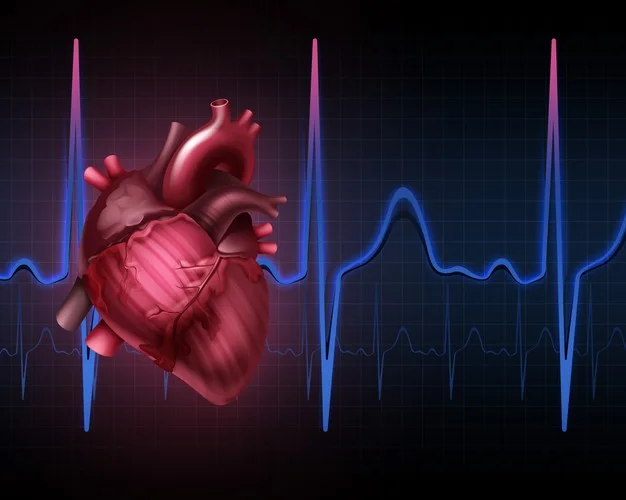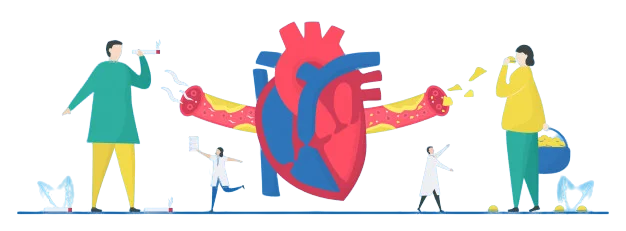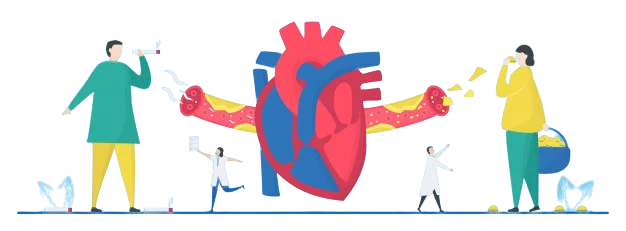Book Your Appointment
Arrhythmia
Disease
Get Solution At Swasthyam Superspeciality Hospital
Arrhythmia Disease
Heart rhythm problems (heart arrhythmias) occur when the electrical impulses that coordinate your heartbeats don’t work properly, causing your heart to beat too fast, too slow or irregularly.
Heart arrhythmias (uh-RITH-me-uhs) may feel like a fluttering or racing heart and may be harmless. However, some heart arrhythmias may cause bothersome — sometimes even life-threatening — signs and symptoms.
Heart arrhythmia treatment can often control or eliminate fast, slow or irregular heartbeats. In addition, because troublesome heart arrhythmias are often made worse — or are even caused — by a weak or damaged heart, you may be able to reduce your arrhythmia risk by adopting a heart-healthy lifestyle.

Symptoms?
Arrhythmias may not cause any signs or symptoms. In fact, your doctor might find you have an arrhythmia before you do, during a routine examination. Noticeable signs and symptoms don’t necessarily mean you have a serious problem, however.
Noticeable arrhythmia symptoms may include:
- A fluttering in your chest
- A racing heartbeat (tachycardia)
- A slow heartbeat (bradycardia)
- Chest pain
- Shortness of breath
Other symptoms may include:
- Anxiety
- Fatigue
- Lightheadedness or dizziness
- Sweating
- Fainting (syncope) or near fainting
Causes
Certain conditions can lead to, or cause, an arrhythmia, including:
- A heart attack that’s occurring right now
- Scarring of heart tissue from a prior heart attack
- Changes to your heart’s structure, such as from cardiomyopathy
- Blocked arteries in your heart (coronary artery disease)
- High blood pressure
- Overactive thyroid gland (hyperthyroidism)
- Underactive thyroid gland (hypothyroidism)
- Diabetes
- Sleep apnea
- Infection with COVID-19
Other things that can cause an arrhythmia include:
- Smoking
- Drinking too much alcohol or caffeine
- Drug abuse
- Stress or anxiety
- Certain medications and supplements, including over-the-counter cold and allergy drugs and nutritional supplements
- Genetics

Causes

Certain conditions can lead to, or cause, an arrhythmia, including:
- A heart attack that’s occurring right now
- Scarring of heart tissue from a prior heart attack
- Changes to your heart’s structure, such as from cardiomyopathy
- Blocked arteries in your heart (coronary artery disease)
- High blood pressure
- Overactive thyroid gland (hyperthyroidism)
- Underactive thyroid gland (hypothyroidism)
- Diabetes
- Sleep apnea
- Infection with COVID-19
Other things that can cause an arrhythmia include:
- Smoking
- Drinking too much alcohol or caffeine
- Drug abuse
- Stress or anxiety
- Certain medications and supplements, including over-the-counter cold and allergy drugs and nutritional supplements
- Genetics
Risk factors
Certain conditions may increase your risk of developing an arrhythmia. These include:
- Coronary artery disease, other heart problems and previous heart surgery. Narrowed heart arteries, a heart attack, abnormal heart valves, prior heart surgery, heart failure, cardiomyopathy and other heart damage are risk factors for almost any kind of arrhythmia.
- High blood pressure. This increases your risk of developing coronary artery disease. It may also cause the walls of your left ventricle to become stiff and thick, which can change how electrical impulses travel through your heart.
- Congenital heart disease. Being born with a heart abnormality may affect your heart’s rhythm.
- Thyroid problems. Having an overactive or underactive thyroid gland can raise your risk of arrhythmias.
- Diabetes. Your risk of developing coronary artery disease and high blood pressure greatly increases with uncontrolled diabetes.
- Obstructive sleep apnea. This disorder, in which your breathing is interrupted during sleep, can increase your risk of bradycardia, atrial fibrillation and other arrhythmias.
- Electrolyte imbalance. Substances in your blood called electrolytes — such as potassium, sodium, calcium and magnesium — help trigger and conduct the electrical impulses in your heart. Electrolyte levels that are too high or too low can affect your heart’s electrical impulses and contribute to arrhythmia development.
Prevention
To prevent heart arrhythmia, it’s important to live a heart-healthy lifestyle to reduce your risk of heart disease. A heart-healthy lifestyle may include:
- Eating a heart-healthy diet
- Staying physically active and keeping a healthy weight
- Avoiding smoking
- Limiting or avoiding caffeine and alcohol
- Reducing stress, as intense stress and anger can cause heart rhythm problems
- Using over-the-counter medications with caution, as some cold and cough medications contain stimulants that may trigger a rapid heartbeat
Prevention
To prevent heart arrhythmia, it’s important to live a heart-healthy lifestyle to reduce your risk of heart disease. A heart-healthy lifestyle may include:
- Eating a heart-healthy diet
- Staying physically active and keeping a healthy weight
- Avoiding smoking
- Limiting or avoiding caffeine and alcohol
- Reducing stress, as intense stress and anger can cause heart rhythm problems
- Using over-the-counter medications with caution, as some cold and cough medications contain stimulants that may trigger a rapid heartbeat
Treatment
If you have an arrhythmia, treatment may or may not be necessary. Usually, it’s required only if the arrhythmia is causing significant symptoms or if it’s putting you at risk of a more serious arrhythmia or arrhythmia complication.
Treating slow heartbeats
If slow heartbeats (bradycardias) don’t have a cause that can be corrected, doctors often treat them with a pacemaker because there aren’t any medications that can reliably speed up the heart.
A pacemaker is a small device that’s usually implanted near your collarbone. One or more electrode-tipped wires run from the pacemaker through your blood vessels to your inner heart. If your heart rate is too slow or if it stops, the pacemaker sends out electrical impulses that stimulate your heart to beat at a steady rate.
Treating fast heartbeats
For fast heartbeats (tachycardias), treatments may include one or more of the following:
-
Vagal maneuvers. You may be able to stop an arrhythmia that begins above the lower half of your heart (supraventricular tachycardia) by using particular maneuvers that include holding your breath and straining, dunking your face in ice water, or coughing.
These maneuvers affect the nervous system that controls your heartbeat (vagus nerves), often causing your heart rate to slow. However, vagal maneuvers don’t work for all types of arrhythmias.
-
Medications. For many types of tachycardia, you may be prescribed medication to control your heart rate or restore a normal heart rhythm. It’s very important to take any anti-arrhythmic medication exactly as directed by your doctor in order to minimize complications.
If you have atrial fibrillation, your doctor may prescribe blood-thinning medications to help keep dangerous blood clots from forming.
-
Cardioversion. If you have a certain type of arrhythmia, such as atrial fibrillation, your doctor may use cardioversion, which can be conducted as a procedure or by using medications.
In the procedure, a shock is delivered to your heart through paddles or patches on your chest. The current affects the electrical impulses in your heart and can restore a normal rhythm.
- Catheter ablation. In this procedure, your doctor threads one or more catheters through your blood vessels to your heart. Electrodes at the catheter tips can use heat, extreme cold or radiofrequency energy to damage (ablate) a small spot of heart tissue and create an electrical block along the pathway that’s causing your arrhythmia.
Message Us
Get In touch with us. Ask Any Question or Book Your Appointment Now
Emergency
+91-8600888444
Book An Appointment
0712-2222111
Contact Us
Location
97/98 Vivekanand Nagar, Near Sai Mandir, Wardha Road, Nagpur
Contact for
Emergency :- +91-8600888444
Book An Appointment:- 0712-2222111
For Latest Updates Follow Us On Facebook
